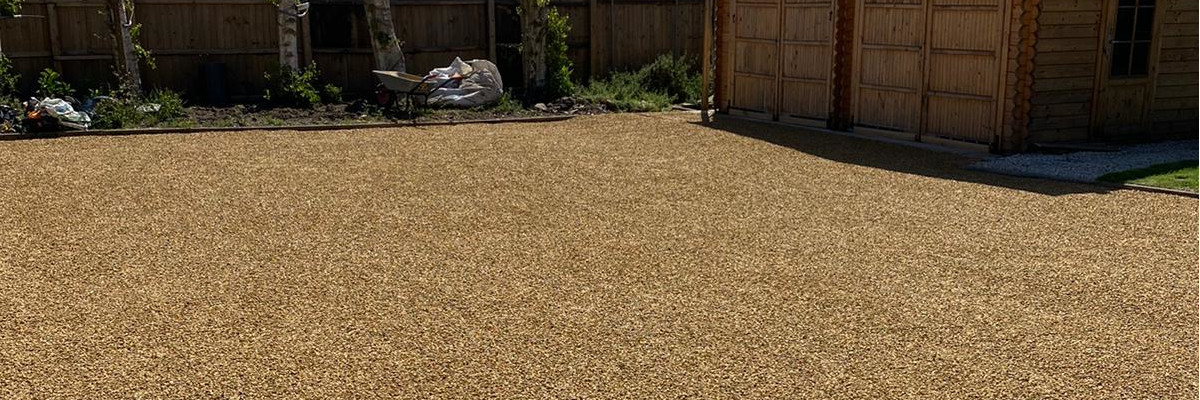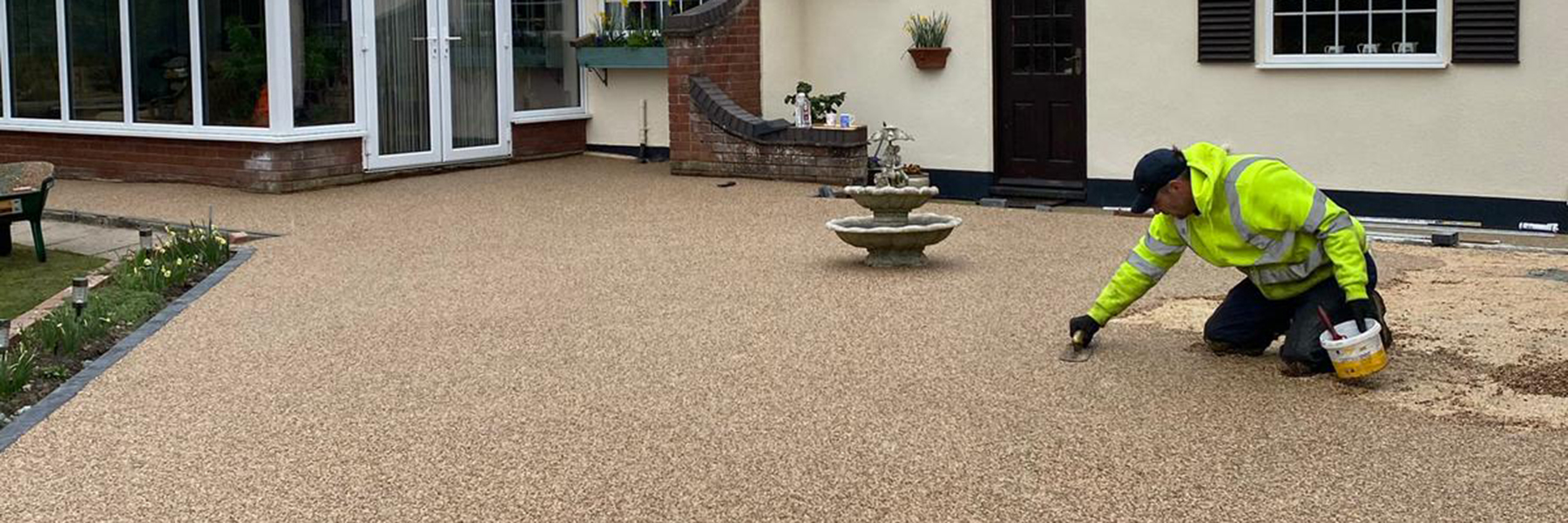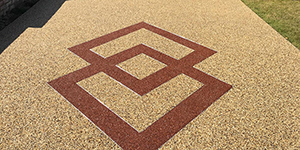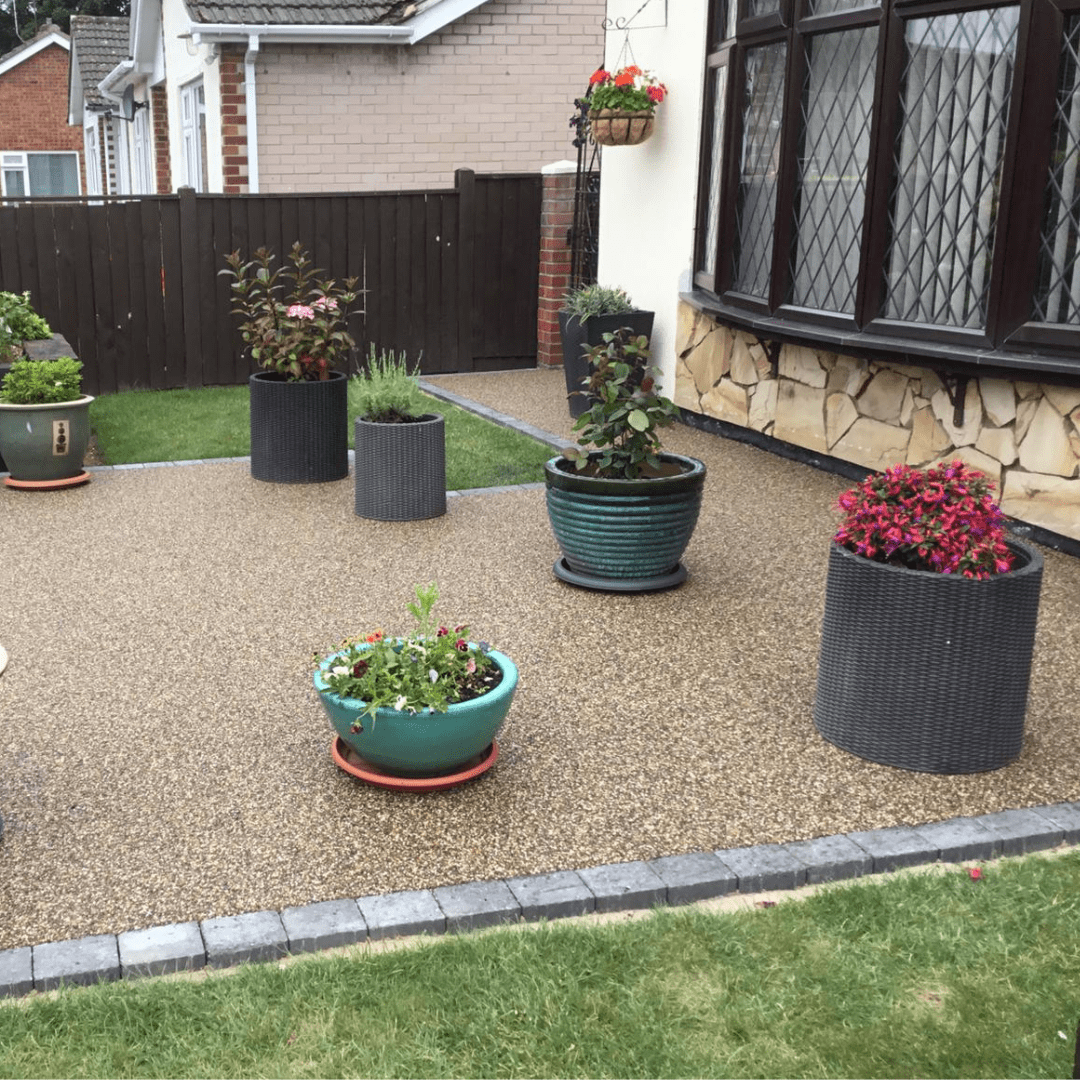Okay, so you’ve decided to invest in a new driveway. You might be looking for a fresh new surface – something a bit different from the existing surface. Or maybe you’re converting a front garden, and your new driveway is to be built where no driveway has been built before!
There’s a great deal of choice when it comes to planning a driveway, and there’s plenty of opportunity to give your home or business a unique look. At Driveline Surfacing, we have lots of experience of tarmac, resin bound, tar and chip, and block paving. But when we’re asked: What’s the most popular surface? … well, it’s difficult to say for sure.
There are pros and cons – in terms of aesthetics, durability, maintenance, and price – to all the driveway surfacing we install. So, let’s ask a slightly different question: What’s the best driveway surface for the UK?
The first consideration that comes to mind is, of course, the weather. The other important factor is drainage – necessary in its own right, but also in a legislative sense. Since 2008, following disastrous flooding in the UK the previous year, provision for drainage in a new driveway has been mandatory.

A resin-bound surface is a smooth, compact mixture of aggregate (pieces of stone) and resin. It’s a relatively new style of surfacing that lends an air of contemporary simplicity to a property.
Effects of Weather
At Driveline Surfacing, we’re sometimes asked if a resin-bound surface will melt in extremely high temperatures. The answer is an emphatic No; the resin’s melting point is a whopping 220°C! And even with the lightest shades of aggregate, the surface colour won’t fade through exposure to sunlight, because we use only UV-stable resin.
A resin-bound driveway is great in wet weather. Because this surface is permeable, water drains through the driveway into the ground, leaving no puddles on the surface.
Drainage
One of the reasons resin-bound driveways have become such a popular choice in the UK is their porosity. Water drains easily through the resin-bound surface – and the porous sub-base – into the earth, eliminating the need for additional drainage infrastructure.
It’s worth noting that, although the driveway surface will hold water, the structural properties of resin bound prevent plants from growing through it, to the surface. Any weeds growing on the resin-bound surface will have come from above – shoes, animal feet, animal droppings, wind, etc – and can be cleared before roots have taken purchase.
Planning Permission
Building Regulations stipulate that hard surfacing of more than 5m2 of domestic front gardens is not permitted unless the surface in question is rendered permeable. This legislation was introduced for the purpose of preventing flooding of the public drainage network, which can’t cope with all the water that runs off the growing number of hard-surfaced gardens.
As resin-bound surfacing is permeable, there’s no requirement for planning permission.

There’s more than 262,000 miles (422,000 km) of roadway in the UK. No wonder the plain black tarmac surface is a familiar sight to us all.
Effects of Weather
The bewitching smell of hot tarmac that rises from the road on a scorching hot day can evoke memories of past summers.
However, the fact that we can smell the tarmac is not really a good thing. In an ambient temperature of 30°C, and in direct sunlight, tarmac can reach a temperature of 50°C. That’s when it begins to melt. In these conditions, indentations from vehicle tyres and feet will make a permanent impression.
Sustained exposure to sunlight will dry out the tarmac, making it brittle, which results in cracking. When ice forms in the cracks, it expands and increases the size of the cracks. Surface ice also presents a slip hazard.
Hot weather is the ideal time to reseal your tarmac driveway. When the sealant is warm, it runs thinly, going deep into the tiny cracks. And the warmer the sealant, the better it will bond with the surface.
Drainage
Tarmac is not porous, and water will settle on the surface. Therefore, the planning of a new tarmac driveway must include a drainage solution – either a natural slope down to your garden, or a means of channelling water to the garden or a waterway.
Planning Permission
Because tarmac is an impermeable surface, a tarmacked area of more than 5m2 isn’t within the parameters of permitted development. However, at Driveline Surfacing, we have plenty of experience in creating simple, cost-effective drainage solutions.

A tar-and-chip surface is made by rolling stone aggregate into a thin layer of hot bitumen.
Effects of Weather
In very hot weather – say, 30°C or above – tar will begin to soften. When this happens, the stone chips will move around in the tar, and as vehicle wheels crunch over the surface, the aggregate can become permanently soiled by the tar.
Drainage
The tar layer in tar and chip is impermeable, so drainage provisions must be made. If the driveway slopes onto a lawn, field, vegetable garden, etc, that’s great. If not – for example, if the surface is flat, or if it slopes towards a road – a drainage system must be installed.
Planning Permission
The relevant planning authority must have evidence that provision has been made for drainage.

Installing a new block-paving (brickweave) driveway is like painting a picture on a brand-new canvas. Except it’s painting by numbers, because the design is yours!
Effects of Weather
Block paving can be a bit slippery in snowy or icy conditions. But when the snow and ice melt, the water will drain away. When the next freeze comes, there’ll be no surface water to turn to ice.
Because block paving drains well, you don’t get puddles when it rains.
Drainage
Block paving drains well. Between the small, impervious paving blocks are sand-filled gaps that allow water to drain away from the driveway surface, through the sub-base and the porous membrane below it, into the earth.
Planning Permission
Because block paving drains well, there’s no need for planning permission.
So: What is the Best Driveway Surface for the UK?
As far as popularity goes, these surfaces are pretty much level pegging. This is a good indication that all four are suitable for the UK – particularly in Norfolk, Suffolk, Cambridgeshire, Essex, and Lincolnshire, where Driveline Surfacing has been installing driveways for more than five years.
But we have to pick a winner. And the winner is … resin bound.
A resin-bound driveway won’t crack in freezing weather, won’t melt in scorching hot weather, and won’t flood in torrential rain. Resin bound is permeable, so will drain naturally, and no planning permission is required. It’s hard-wearing, anti-slip, low maintenance, and it looks fantastic.
Get a free no obligation quote
Areas Covered
Latest Posts
How Long Do Resin Driveways Last? Factors That Affect Their Longevity
When considering a new driveway, resin-bound surfaces' durability and aesthetic appeal are often enticing. [...]
The Ultimate Guide to Resin Bound
Resin-bound surfaces have become a very popular choice for driveways, patios, pathways and other [...]
The Ultimate Guide to Tar & Chip
Tar and chip is becoming an increasingly popular surface option in the UK thanks [...]







